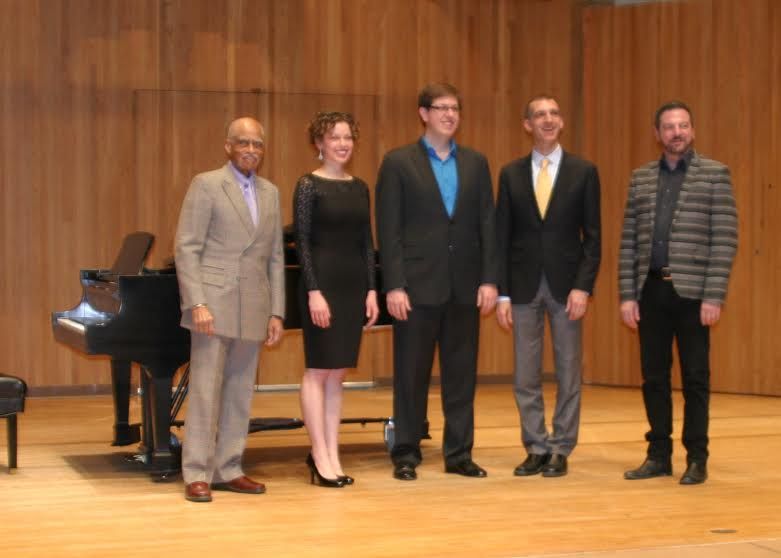Recap: Iowa District’s Metropolitan Opera National Council Auditions
Courtesy of Sara Compton, Iowa State Center
The judges stand with opera singers Bethany Hickman and Gerard D’Emilio at the Iowa District Metropolitan Opera National Council Auditions. Of the 21 auditioning singers, Hickman and D’Emilio are the only two singers advancing to the Ordway Center for the Performing Arts in St. Paul, Minnesota, on January 31, 2015. From left to right: George Shirley (judge), Bethany Hickman, Gerard D’Emilio, Dan Novak (judge) and Richard Walters (judge).
January 13, 2015
While wearing fur-trimmed coats and fancy dress clothes makes a statement, it seems many of the audience members came dressed to impress at the Iowa District’s Metropolitan Opera-or Met-National Council Auditions.
Held at noon on Jan. 10 in the Martha-Ellen Tye Recital Hall, the auditions were directed by Sara Compton, outreach coordinator at the Iowa State Center, and Donald Simonson, ISU Morrill professor of music and theatre, and featured 21 singers from across the United States.
With more than 1,500 singers — between the ages of 20 and 30 — participating in the Met auditions each year, seven men and 13 women sang in Ames for a chance to compete later this month on January 31, 2015. Two singers will be chosen to advance to New York City and the National Semifinal competition, where the competition will be whittled down even more.
Each singer performed two of five prepared arias, which are elaborate melodies sung solo with piano accompaniment, that vary in musical styles and languages. In this “American Idol” for opera, judges choose to hear one of the five songs the singer has prepared after their initial aria is performed.
For the Iowa District’s auditions, the three volunteer judges included Dan Novak, Director of The Patrick G. and Shirley W. Ryan Opera Center, Richard Walters, Vice President of Classical and Vocal Publications at Hal Leonard Corporation — the world’s largest print music publisher — and George Shirley, who is one of America’s most versatile tenors and the first African American to win the Met Auditions and sing leading roles with the Metropolitan Opera. Shirley is internationally acclaimed and has performed more than 80 operatic roles during his 54-year career.
The stated purpose of the auditions is to find singers with the most promising career potential. As part of the audition experience singers, have the opportunity to meet with prominent judges, who provide feedback, career advice and recommendations for work, advanced study or apprenticeships.
While each singer chooses their first piece to sing for the judges, Mozart’s famous arias were a popular choice among singers and the judges. The audience was asked to hold their applause after the first aria, while judges conferred and chose a second aria for the singer to perform. Clapping loudly for their favorite performers, the audience’s excited whispering was audible between performances.
Of the 42 arias performed, only seven were in English, so following along to the lyrics was not an option for most of the auditions. With so many performers, the audience was recommended to mark notes on their programs, which displayed photos of each singer along with a list of their five potential arias. A few singers chose to open their audition with an unlisted aria, but most singers performed from their listed repertoire in the program.
All but two potential opera stars were accompanied by Jodi Goble, collaborative pianist and composer and director of ISU Opera Studio. Goble teaches diction and song literature at Iowa State and works closely with many of the singers in preparation for their audition performances.
While judges deliberated the winners in a private room, audience members had five minutes to vote for their favorite singer in an Audience Choice Award, which is new this year at the Met Auditions.
Once depositing their ballots into boxes outside the recital hall, the audience joined the singers in the lobby, where a sizable variety of refreshments and appetizers were offered. Cupcake Emporium and Bar La Tosca offered mini cupcakes and croissants with other savory and sweet food options from other vendors.
After four and a half hours of singing, with roughly 40 minutes of refreshments, the audience resumed their seats and nine awards were given to singers, and two singers advanced to the next audition in St. Paul, Minnesota.
Bass-baritone Gerard D’Emilio was presented with the Martha-Ellen Tye Career Development Award of $1000, given by Mark North, general manager of the Iowa State Center. Also receiving the first-ever Audience Choice Award of $250, D’Emilio won over the audience with his deep voice and command of the stage, charming the audience with his devilish grin and suave character.
The second singer to advance was Bethany Hickman, mezzo-soprano, who was awarded with the Jodi Goble Award of $1000, presented by Donald Simonson.
Although Hickman and D’Emilio are the only two singers advancing to St. Paul, the Michael Gowdy Memorial Award was split between six singers, who will receive $300 each in the mail as an encouragement award for advancing their opera careers. These recipients include: Rebecca Sorensen, soprano; Eric Ferring, tenor; Rebecca Kidnie, soprano; Victoria Vargas, mezzo-soprano; Chloe Peterson, soprano; and Lauren Henderson-Turner, mezzo-soprano.
In the final round of the National Semifinal competition, ten singers will be selected to compete on stage at the Met and will be accompanied by the Metropolitan Opera Orchestra in the Grand Finals Concert on March 22, 2015.







